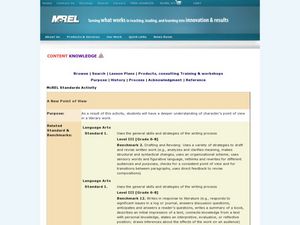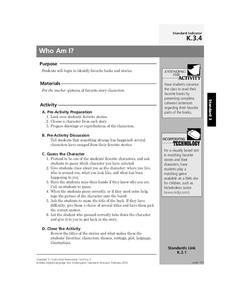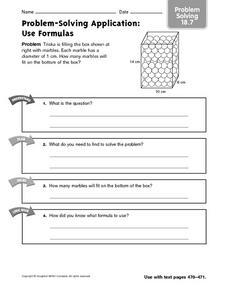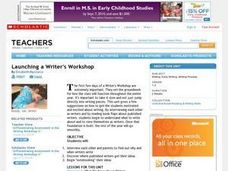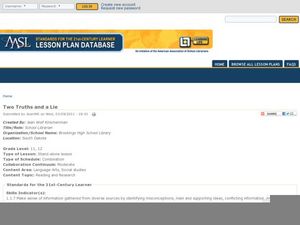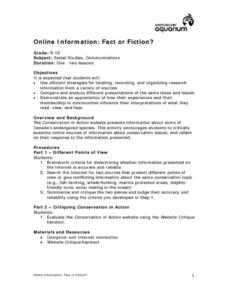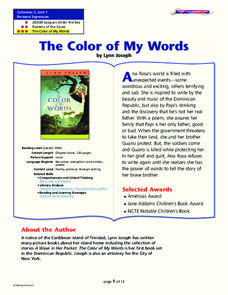Curated OER
A New Point of View
Analyze point of view and how it affects a literary work with this lesson. Middle schoolers create a written piece that focuses on point of view. They review the literary term "point of view," and explore examples of the term in text....
Curated OER
Order! Order!
Polish organization skills in your youngsters. With this lesson, they are introduced to the trait of organization and participate in activities that reinforce organization. They cut apart a familiar story, receive different...
Curated OER
Visualizing Skip Counting by 2
Drawing pictures to solve math problems is not only a good problem solving strategy, it's also mathematical modeling. First graders read six basic word problems that have them skip count by twos to find the answer. They draw pictures in...
Curated OER
Reading and Responding: Lesson 12
Fourth graders participate in reading a poem. They practice test-taking strategies, answering multiple-choice questions, and answering short-answer questions. They continue to practice these techniques and strategies and use them in...
Curated OER
Word Problems
Students use the "gist" strategy to understand how to dissect parts of a word problem. In this word problem lesson plan, students learn how to solve word problems and then solve them.
Curated OER
Casting a Wide Net
Students investigate topics that would be suitable for classroom podcasts. They read an online article, write and produce a podcast.
Curated OER
Problem Solving
In this problem solving worksheet, students read a word problem and then illustrate 5 steps given. For example, "What do I know?" and "What do I need to find out?"
Curated OER
Who Am I?
Pupils read a story together then choose a favorite character to portray. In this inference lesson, students pretend to be one of the characters in the story, they prepare drawings or actions then present them to the class. Pupils...
Curated OER
Problem-Solving Application 18.7
In this problem solving worksheet, students read a problem about marbles in a box and analyze the diagram. Students fill out 4 essay questions that take them through the problem solving process before answering the question. No formula...
Curated OER
Examine Persuasive Elements by Reading, Analyzing, and Discussing Persuasive Text
Young scholars identify persuasive strategies and analyze arguments. In this persuasive writing lesson, students read "Chief Red Jacket's Reply" and "Reverend Cram's Speech to the Iroquois Nation" and chart major elements of each...
Curated OER
Sensational Summarizers
Students study strategies that aid comprehension. They focus on the main ideas of a passage and eliminate unnecessary and repetitive information. They substitute super ordinate terms for a list of items and create a topic sentence.
Curated OER
Reading the Periodic Table
Students explore the structure and function of the periodic table of elements. Though memorization drills and games, students working in pairs, identify the elements of the periodic table, their grouping, their properties and their...
Curated OER
Media Literacy
Students evaluate the effectiveness of Internet book clubs, present their findings to the class, and design their own on-line book club (under the umbrella of a fictional television program) to encourage non-readers to read more.
Curated OER
From Page to Screen
Young scholars consider how xerographic photocopy machines and scanners operate. They discuss and practice using scanners, and brainstorm strategies to increase the efficiency of Google's scanning project.
Curated OER
Talking About a Resolution
Students explore Nobel Prize winning economist Thomas C. Schelling's strategic egonomics theory as it applies to making new year's resolutions. They make their own resolutions and develop plans to keep them using Schelling's strategies.
Curated OER
Launching a Writer's Workshop
Students interview each other and their parents to examine why and when writers write and where published authors get their ideas. They complete a class T-chart, fill-out an interview worksheet, and read and discuss a variety of book...
Curated OER
Finders Keepers: Vocabulary Instructional Routine Guide for Extremely Loud and Incredibly Close
Like Oskar, the curious boy in Jonathan Safran Foer’s story, class members journey through other “stories that the mouth can’t tell” to find another sentence that uses a word found in novel. Individuals create their own vocabulary list,...
Novelinks
Tuck Everlasting: Bio-Poem
Learn about the characters of Natalie Babbitt's Tuck Everlasting with a character biopoem. Readers fill in a poem format to detail the character traits of Winnie, Jesse, Miles, and Mae, and share their finished poems...
Curated OER
Two Truths and a Lie: Internet Research Skills
It's tough for high schoolers to assess what is a credible resource and what is not. A helpful resource prompts class members to research a particular topic and record two facts—and create one lie—while documenting the sources. They...
Curated OER
Macbeth News Broadcast
Here is an authentic assessment task for Shakespeare's Macbeth. Young literature scholars prepare, perform, and record a news broadcast about the major events in the play. For example, groups may choose to report on the death of Lady...
Curated OER
Online Information: Fact or Fiction
Discuss ways to determine if the information middle and high schoolers gather online is accurate. Using the Internet, they cite two sources that show conflicting points of view on a subtopic of conservation. They summarize and analyze...
Curated OER
Sentence Combining
Learners practice sentence combining at increasingly difficult levels throughout a week. They begin with nouns and verbs and build to contrasts, parallels, etc.
Curated OER
The Color of My Words
Explore the story The Color of My Words by Lynn Joseph using this resource. Learners answer comprehension questions, fill in graphic organizers, and write a poem.
Curated OER
Perfect Numbers
Sixth graders classify numbers as abundant, deficient, or perfect based on the relationship between the number and its factors. They review factor game using the completed lab sheet. When playing the factor game which type of numbers...
